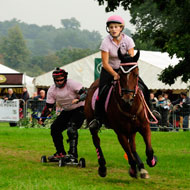
A rescue horse has overcome a difficult start and risen to success in a thrilling new sport
A rescue horse who started life as a neglected and malnourished foal, has found her feet in a new sport called horse boarding, with the help of her new owner Rachel Simington.
Candy was just 14 months old when she was found by international horse charity World Horse Welfare, standing over her collapsed and emaciated mother. The mother and daughter pair were rescued, along with another youngster, and the three horses underwent a rigorous rehabilitation programme.
Miraculously, all three horses made a full recovery and Candy was rehomed with thrill-seeking Rachel in 2012.
Candy and Rachel began training and competing in horse boarding, an adrenaline-fuelled sport founded in 2004 by Horse Boarding UK. The sport involves participants being towed behind their horse at speeds of up to 35mph on an off-road skateboard, whilst the rider and boarder work together to control speed and acceleration.
Before long the pair were winning competitions all over the country and Candy gained confidence in her new surroundings.
Rachel says: “People see the sport and think their horse has got to be at competition level to take part but that is simply not true. [Candy] could barely even canter before we started boarding together which limited us when it came to activities like jumping and dressage.
“With the boarding it’s different because she has to focus and really think about turning and moving through obstacles with the boarder behind her, so she doesn’t worry about the cantering part. It just goes to show that you don’t need a certain type of horse to compete at this sport. It has taught me that with time and patience, anything can be achieved.”
World Horse Welfare hosts Horse Boarding UK’s "Have a Go" sessions at its Hall Farm Rescue and Rehoming Centre in Norfolk on selected Sundays. For information about taking part, call Hall Farm on 01953 499 100 to find out more.
Image courtesy of Joe Beasant.



 The RCVS has announced a new version of its 1CPD mobile app, with enhanced features for veterinary surgeons and veterinary nurses to record their continuing professional development.
The RCVS has announced a new version of its 1CPD mobile app, with enhanced features for veterinary surgeons and veterinary nurses to record their continuing professional development.